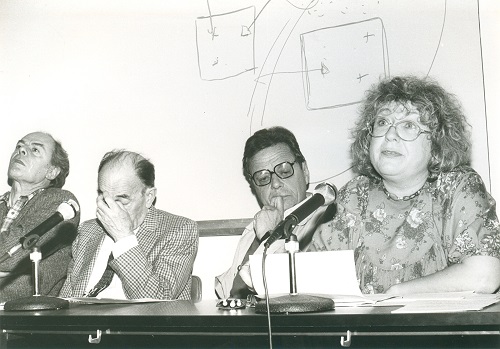
Australians continue to study the celebrated funeral oration attributed to Pericles at school and at university. Often the French are surprised to learn this. For them Australia is simply a distant land with fierce bushfires and very strange animals. Yet studying ancient Greece in Australia dates back to the arrival of Europeans two centuries ago.
The first colonial leaders of my country feared that their civilisation would be lost. Europe was very far away and most of their fellow colonists were convicted criminals. Consequently they saw it as an urgent task to inculcate everyone in the core values of the European Enlightenment. These leaders saw studying ancient Greece at school as an important way to achieve this.
The French are no less surprised to learn that an Australian has come to France to research ancient Greece. They understand why Australian philosophers might come there. It is a matter of national pride that ‘French theory’ conquered the Anglophone world in the 1980s. But few French realise that among students of ancient Greece ‘the Paris School’ was just as influential.
The leading figures of this Paris-based circle of ancient historians were Jean-Pierre Vernant and Pierre Vidal-Naquet. Reading their books as well as those of younger circle-members completely changed our lives. It turned me and other Australian students of ancient Greece into the cultural historians that we are today.
The book of ‘the Paris School’ that had the greatest impact on us was The Invention of Athens by Nicole Loraux (figure 1). Before its publication, in 1981, historians had accorded little importance to the funeral oration. For them the oration of Pericles and the other annual speeches in honour of the war dead consisted only of clichés.
Loraux proved them wrong by showing the central role that this genre played in the maintenance of Athenian self-identity. The Invention of Athens demonstrated that each staging of a funeral speech helped the Athenians to maintain the same ‘imaginary’ over two centuries.
Thus, according to this genre, Athenians were almost always victorious because they were more courageous than the other Greeks. In fighting for the safety or liberty of others they waged only just wars.
The Invention of Athens was a remarkable achievement. It was striking that Loraux even studied the funeral oration at all. This genre endorsed a rampant cultural militarism: it claimed that war brought only benefits and minimised its human costs.
This was at odds with the strong anti-militarism on the French left during the 1970s. In studying the funeral oration Loraux was absolutely going against the tide.
It is just as remarkable that she did this without the tools that we take for granted. Today the studies of social memory and oral tradition are well established. This was not the case when Loraux wrote her first book.
Indeed the only tool that she was able to use was French and Italian Marxism of the 1970s. Anyone who has tried to understand Louis Althusser knows that this tool is not so useful.
The Invention of Athens was also remarkably different from the other works of ‘the Paris School’. At this time, Vernant and Vidal-Naquet were researching the basic structures of Greek thought. What Loraux discovered was much more complicated: a complex narrative of self-identity and a series of discursive practices that maintained it.
In spite of its huge impact, The Invention of Athens was far from a complete work. In particular, it did not compare the funeral oration with the other literary genres that Athenian democracy had produced.
Consequently Loraux did not prove three audacious claims. Her first claim was that ‘the imaginary’ that one can observe in the funeral oration had made a big impact on political debates about war.
Loraux no less audaciously claimed that Athenian democracy did not have the capacity to invent its own core values. Consequently, the Athenians were condemned to use traditional aristocratic values. Loraux felt that she had found the evidence for this in the funeral oration.
Her third audacious claim was that plays and oratory generally copied the pro-war message of the funeral oration. This would mean that democratic Athens lacked the strong critique of militarism that is quite common in present-day democracies.
The project that I am currently directing aims to complete The Invention of Athens by undertaking this comparison between all the literary genres of Athenian democracy.
Already this project is confirming Loraux’s first claim. It is true that Athenian politicians often argued for a war in terms of the state’s self-interest. But their speeches just as often drew on the same self-identity as the the funeral oration.
Clearly idealism too played an important role in Athenian foreign affairs.
Yet, this comparison refutes Loraux’s second audacious claim. A military speech is rarely a good opportunity for describing democracy.
By contrast, in their political debates, Athenian leaders were very good at justifying core democratic values. By comparing autocracy and democracy the tragedians did this even better.
My project on the funeral oration is affirming no less Loraux’s final audacious claim. Admittedly Athenian comedies argued that making love was preferable to war, while tragedies indirectly referred to its heavy costs.
Nevertheless, drama still generally depicted war as a very good thing and the wars that the Athenians had waged as always just. Athenian politicians conceded even less: they simply followed the funeral oration in talking up war’s benefits.
Certainly studying ancient Greece remains an important way to learn about many of Europe’s core values. However, the funeral oration of Pericles or any other Athenian speech for that matter is no lesson in peace.
From their sombre history of the last two centuries Europeans have learnt that peace rests on peaceful norms, shared identities and conciliatory public discourses.
This lesson is no less important than those from ancient Greece.
This is the speech that Associate Professor David M. Pritchard gave in French at a study day in France last year. You can listen to the recording of his speech here . This English version was first published here in Greece’s Kathimerini.



